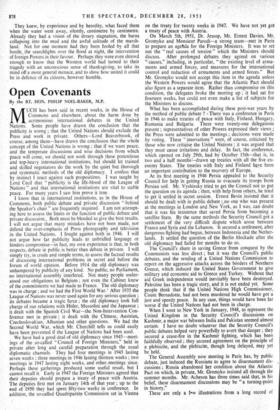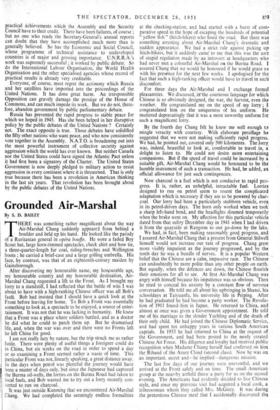Open Covenants
By the RT. HON. PHILIP NOEL-BAKER, M.P.
MUCH has been said in recent weeks, in the House of Commons and elsewhere, about the harm done by acrimonious international debates in the United Nations. Some people have drawn the conclusion that the publicity is wrong ; that the United Nations should exclude the Press and work in private. Others—Lord Beaverbrook, of course, among them—have drawn the conclusion that the whole concept of the United Nations is wrong ; that if we want peace, and the temperate discussions and wise decisions from which peace will come, we should not work through these pretentious and top-heavy international institutions, but should let trained and skilled negotiators do the work by the quiet but thorough and systematic methods of the old diplomacy. I confess that by instinct I react against such propositions. I was taught by Lord Cecil that "publicity is the life-blood of the League of Nations" and that international institutions are vital to stable peace. For many years I saw him prove it true.
I know that in international institutions, as in the House of Commons, both public debate and private discussion "behind the Speaker's chair" are frequently required. I am not attempt- ing here to assess the limits or the function of public debate and private discussion,_ Both must be blended to give the best results.
I will not .argue that many mistakes have not been made, nor defend the over-emphasis of Press photography and television in the United Nations. I fought against both in 1946. I will not argue how far publicity leads to unbridled language or hinders compromise—in fact, my own experience is that, in both respects, debate in public is better than debate in private. I will simply try, in crude and simple terms, to assess the factual results of discussing international problems in secret and before the forum of world opinion. Before 1914 the old diplomacy was unhampered by publicity of any kind. No public, no Parliament, no international assembly interfered. Not many people under- stood our obligations to Belgium ; not even the Cabinet knew of the commitments we had made to France. The old diplomacy was in charge ; and we had the First World War.' After 1935 the _ League of Nations was never used again for any serious question ; its debates became a tragic farce ; the old diplomacy took full charge of our relations with Hitler, Mussolini and the Japanese ; it dealt with the Spanish Civil War—the Non-Intervention Con- ference met in private ; it dealt with the Chinese, Austrian, Czechoslovakian, Albanian and other questions. We had the Second World War, which Mr. Churchill tells us could easily have been prevented if the League of Nations had been used.
We have had a good deal of old diplomacy since 1945—meet- ings of the so-called "Council of Foreign Ministers," held in private after long and careful preparation through the usual diplomatic channels. • They had four meetings in 1945 lasting seven weeks ; three meetings in 1946 lasting thirteen weeks ; two meetings in 1947 lasting eight weeks, and other,meetings since. Perhaps these gatherings produced some useful result, but I cannot recall it. Early in 1947 the Foreign Ministers agreed that their deputies should prepare a treaty of peace with Austria. The deputies first met on January 14th of that year ; up to the end of 1950 they had spent fifty-two weeks in conference. In addition, the so-called Quadripartite Commission sat in Vienna on the treaty for twenty weeks in 1947. We have not yet got a treaty of peace with Austria.
On March 5th, 1951, Dr. Jessup, Mr. Ernest Davies; Mr. Gromyko and Monsieur Parodi—a- strong team—met in Paris to prepare an agenda for the Foreign Ministers. It was to set out the "real causes of tension" which the Ministers should discuss. After prolonged debates they agreed on various "- causes," including, in particular, "the existing level of arma- ments and armed forces, and measures for the international control and reduction of armaments and armed forces." But Mr. Gromyko would not accept this item in the agenda unless the Western Powers would agree that the Atlantic Pact should also figure as a separate item. Rather than compromise on this condition, the delegates broke the meeting up ; it had sat for fourteen weeks, but could not even make a list of subjects for the Ministers to discuss.
What has been accomplished during these post-war years by the method of public debate ? • There was a conference in Paris in 1946 to make treaties of peace with Italy, Finland, Hungary, Rumania and Bulgaria. There were twenty-one delegations present ; representatives of other Powers expressed their views; the Press were admitted to the meetings ; decisions were made by voting. These "innovations" were, of course, criticised by those who now criticise the United Nations ; it was argued that they must cause irritations and delay. in fact, the conference, which opened on July 29th, had by October 15th—that is, in two and a half monthsdrawn up treaties with all the five ex- enemy States. The treaties with Italy and Finland ba,ve been an important contribution to the recovery of Europe.
At its first meeting in 1946 Persia appealed to the Security Council for help in getting Russia to evacuate its troops from Persian soil. Mr. Vyshinsky tried to get the Council not to put the question on its agenda ; then, with help from others, he tried to get it settled in secret session. Ernest Bevin insisted that it should be dealt with in public debate ;,no one who was present at the meetings in London and New York, as I was, can doubt that it was his insistence that saved Persia from becoming a satellite State. By the same methods the Security Council, got a settlement of the very difficult dispute which arose between France and Syria and the Lebanon. It secured a settlement, after dangerous fighting had begun, between Indonesia and the Nether- lands. It settled the question of the Berlin blockade after the old diplomacy had failed for months to do so.
The Council's share in saving Greece from conquest by the Communists was less direct ; but it was the Council's public debates, and the sending of a United Nations Commission to report on the aggressive attacks across the borders of Northern Greece, which induced the United States Government to give military and economic aid to Greece and Turkey. Without that aid Greek independenbe would inevitably have been destroyed. Palestine has been a tragic story, and it is not ended yet. Some people think that if the United Nations High Commissioner, Count Bernadotte, had not been murdered he would have got a just and speedy peace. In any 'case, things would have been far worse if the United Nations had not been in charge.
When I went to Nev York in January, 1948, to represent the United Kingdom in the Security Council's discussions on Kashmir, a major war between India and Pakistan seemed almost certain. I have no doubt whatever that the Security Council's public debates helped very powerfully to avert that danger ; they secured a cease-fire in the Kashmir fighting, which has been faithfully observed ; they secured agreement on the principle of a plebiscite, and the plebiscite, though long delayed, may yet be held.
The General Assembly now meeting in Paris has, by public debate, just induced the Russians to agree to disarmament dis- cussions; Russia abandoned her condition about the Atlantic Pact on which, in private, Mr. Gromyko insisted all through the summer months. Mr. Acheson has three times said that, in his belief, these disarmament discussions may be "a turning-point in history." These are only a P.m/ illustrations from a long- record of practical ichievements which the Assembly and the Security Council have to their credit. There have been failures, of course ; but no one who reads the Secretary-General's annual reports can doubt that they have accomplished much more than is generally believed. So has the Economic and Social Council, whose. programme of technical assistance to undeveloped countries is of major and growing importance. U.N.R.R.A.'s work was supremely successful ; it worked by public debate. So do the International Labour Organisation, the World Health Organisation and the other specialised agencies whose record of practical results is already very creditable. Everyone, of course, must regret the acrimony which Russia and her satellites have imported into the proceedings of the United Nations. It has done great harm. An irresponsible Opposition can gravely damage . the prestige of the House of Commons, and can much impede its work. But we do not, there- fore, abandon government by public parliamentary debate. Russia has prevented the rapid progress to stable peace for which we hoped in 1945. Has she been helped in 'her disruptive policy by the public debates of the United Nations ? Certainly not. The exact opposite is true. Those sdebates have solidified the fifty other nations who want peace, and who now consistently vote together in the Assembly. N.A.T.O. is broadening out into the most powerful instrument of collective security against aggression which the world has ever known. But neither Canada nor the United States could have signed the Atlantic Pact unless it had first been a signatory of the Charter. The United States Government is now deeply pledged to military action to resist aggression in every continent where it is threatened. That is only true because there has been a revolution in American thinking in the last six years. That revolution has been brought about by the public debates of the United Nations.































 Previous page
Previous page